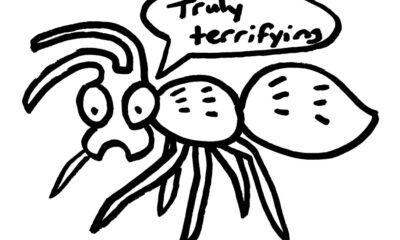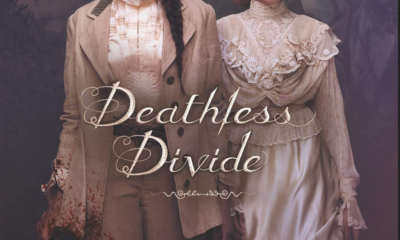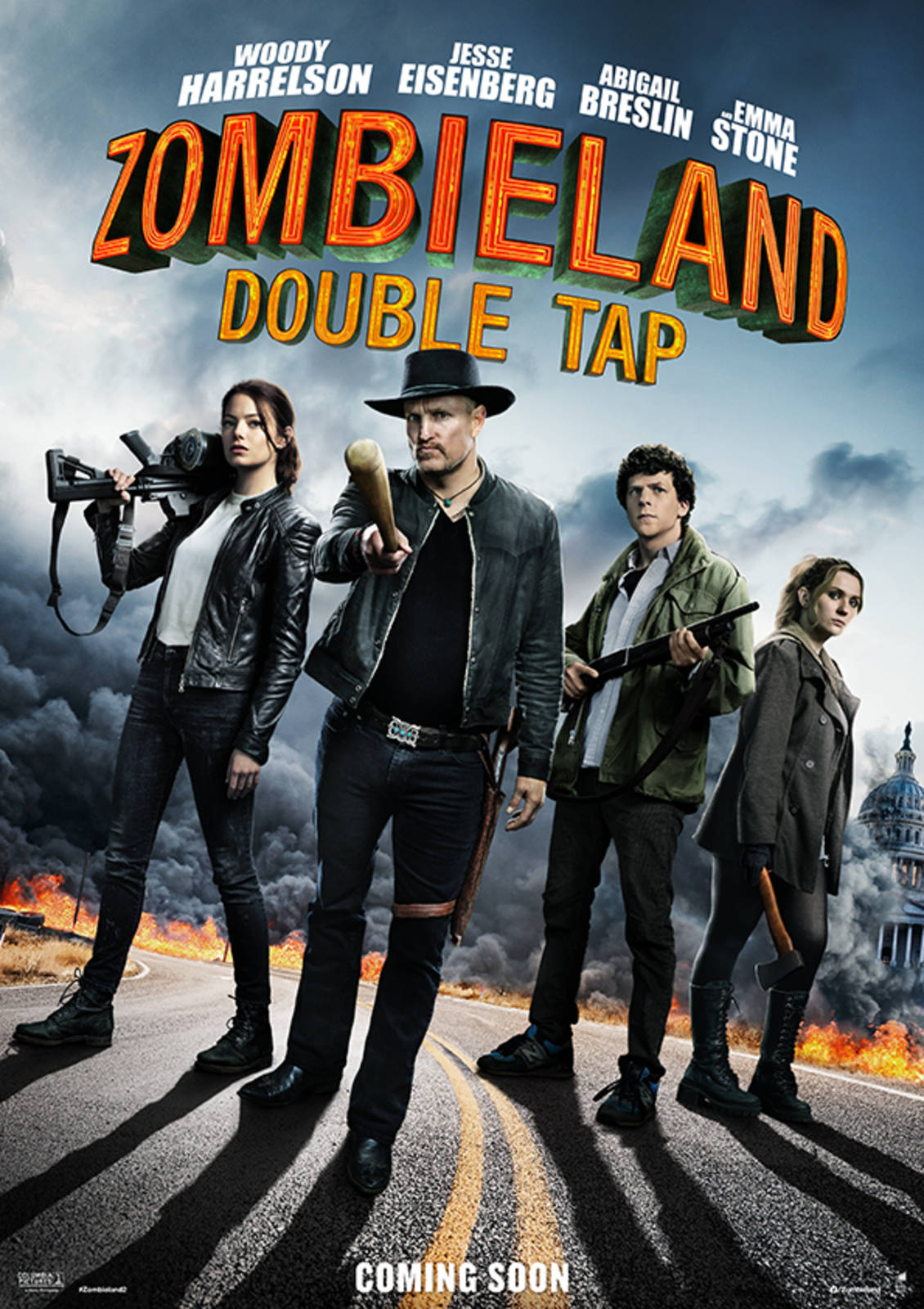
Zombieland: Double Tap (2019) Review
I was 22 years old when the first Zombieland was released and I ate it up like it was made for me. It was in the early stages of that zombie-zeitgeist that made up a good portion of the 2010s, just after the previous run that spanned the late 90s to the mid-2000s. This was around the time I learned that I loved zombie stories. I got deep into Romero’s works, and played my fair share of the Resident Evil series.
So the idea of a comedy about zombies was inherently appealing and I fell in love with Zombieland. It’s been 10 years, though. I have grown… but Zombieland never did.
Catching up with Colombus and the Gang
Zombieland: Double Tap (2019) is a horror-comedy following a group of survivors around the undead USA. The film is a sequel to 2009’s Zombieland and reunites the entire cast (yes, even that one, the voice of a certain talking orange tabby). The film is set about a decade after the original film.
Being together for a decade is sure to test the limits of any family, and the story follows a slight fracturing as members of the core four seek to find something different. Eventually, Little Rock finds herself on the road with Berkley, a self-styled hippie, leading to a chase across the US to find Little Rock. The zombies of Zombieland, however, have evolved, bringing in a whole host of new challenges.
Double Tap shows the ongoing adventures of Columbus, Tallahassee, Witchita, and Little Rock, and introduces a much larger world compared to the lean original film. Woody Harrelson, Jesse Eisenberg, Emma Stone, and Abigail Breslin reprise their roles. The expanded cast also adds Rosario Dawson, Zoey Deutch, Luke Wilson, and Thomas Middleditch. And yes, Bill Murray returns. He’s become quite the zombie-fan it seems.
Ruben Fleischer returns to direct the sequel, written by Rhett Reese, Paul Wenick, and Dave Callaham.
What works about Zombieland: Double Tap?
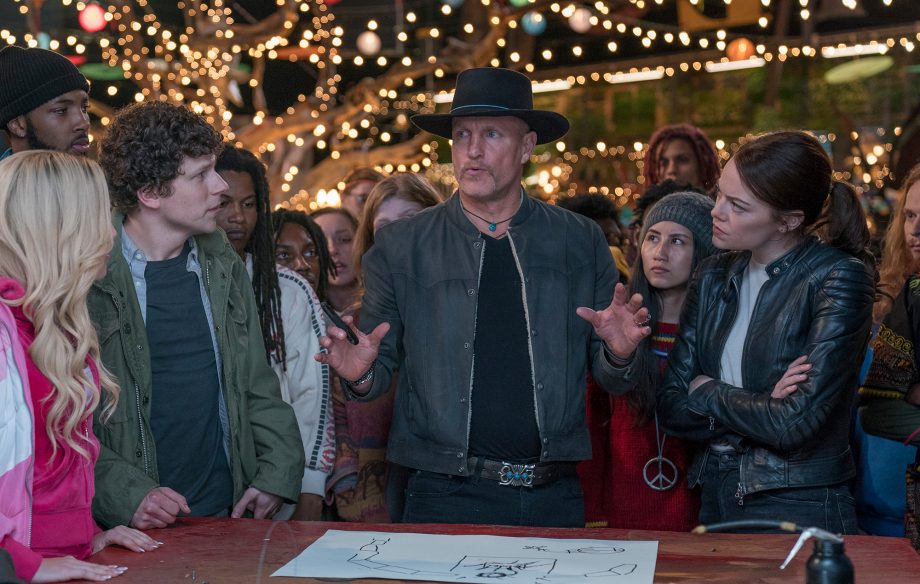
Zombieland: Double Tap is basically a slight tweak on the first film, and that’s fine. It doesn’t aspire to do much beyond expand the scope of the world a bit and throw in a couple of roadblocks here and there. That’s fine. It’s just not all that compelling.
What worked with the original Zombieland has been diminished after about a decade of other zombie films and other comedies. As long as you don’t expect much, it is a fun little movie. There are some legitimately fun moments, such as a great one-take-style fight against two of the new “super zombies” in a tourist-trap motel themed around Elvis Presley. At this moment, and the moment just prior to – a rather meta meeting of archetypes – the movie is at its best.
The decision to expand the scope of the film by including so many other survivors is ultimately a neat idea, but it does not deliver much beyond that meta-gag of Columbus and Tallahassee’s doubles.
What didn’t work?
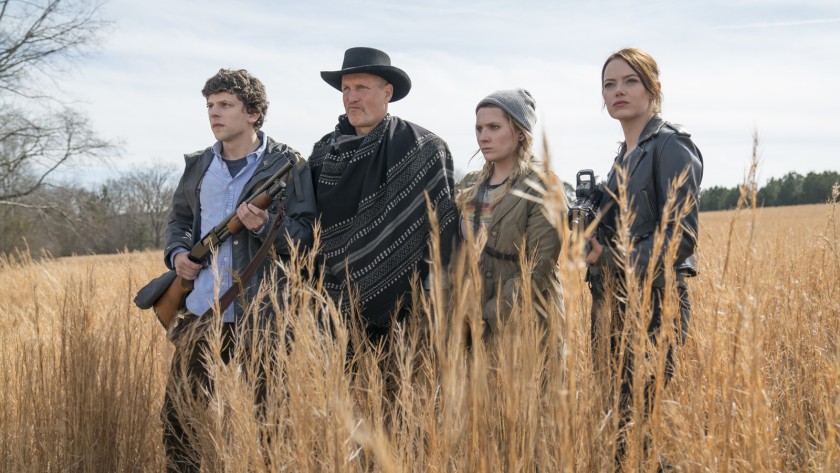
Double Tap feels like a sequel that came far too late. It feels slower and less bright, unlike those super-zombies, it introduces. It also is quick to raise interesting ideas and throw them aside as well. The ominous herd of these super-zombies seems like a real threat, especially when they establish them as individual threats. However, the ending kind of forgets how powerful and relentless these zombies are and it turns them into, again, a mindless horde.
The characters do not really feel all that interesting after ten years. Woody Harrelson still carries the film as Tallahassee and remains the highlight. The other characters, however, are highly static. Eisenberg’s Columbus comes off as more irritating than quirky ten years later. Emma Stone’s Wichita is curiously subdued and has an emotional arc that sort of doesn’t really work dramatically. Abigail Breslin’s Little Rock is playing the same notes from the first film, only a little surlier and full of teenage angst. Rosario Dawson’s Reno is just a sort of stock, Rosario Dawson role.
Zombieland: Double Tap is also just incredibly sterile-feeling for a film about flesh-eating undead. It has that reliance on CGI mayhem that strips the tangible threat of the zombies away. Zombies work best as practical effects and CGI blood carries absolutely no weight.
It all feels so toothless, which is what is so sad. But looking back on the original, which was something I did about a month ago, I realize that what worked then largely does not work now. I think I left Zombieland behind, there wasn’t that same sort of spark I had at 22 years old.
Final Impressions
Zombieland: Double Tap is a safe and suitable follow up to the original, with an emphasis on safe. It is more of the same which will appeal to some viewers but ultimately left me feeling cold.
The mid-credit scene, however, is a lot of fun.
 (2 / 5)
(2 / 5)
Do you feel we were fair in our assessment of Zombieland: Double Tap? Why not check out some more of our reviews at Haunted MTL?
Movies n TV
Wheel of Time A Question of Crimson Is a Political Espionage Delight
Episode two of Wheel of Time felt like the beginning of a long journey. Stories are unfolding, lives are changing, and blood is spilling.
Let’s discuss.
The story
We begin this episode in the past with Elayne’s mother, Queen Morgase. It turns out her rise to the throne was a bit, shall we say, cutthroat. So when she shows up at the White Tower, Siuan is concerned.
She might have reason to be, too.
Meanwhile, Rand, Egwene, Moiraine, Lan and Aviendha are in the Spine of The World. As they travel through some of the most breathtaking lands I have ever seen on a TV show, Egwene is plagued with nightmares. We think at first that’s just her trauma working itself through her system. But we soon find out that it might not be that straightforward.
Finally, Perrin returns home to heal after his hand is almost cut in half. But when he gets there he finds the town has been infested by Children of The Light. And they’re looking for him.
What worked
There was something heartwarming in this episode about political espionage and choking religious persecution. And that is Elayne’s relationship with her family.
I have consumed a lot of fantasy content with royal families. And I have never once heard a princess call her mother ‘Mum’. I’ve never seen royal siblings get along. And I have sure as hell never seen a princess have a good relationship with her step-parent.
This was refreshing. Even though Queen Morgase is kind of a horrible person she seems like a good mother. And that’s an unexpected delight.

Of course, this is just one storyline among many. And while this can sometimes be overwhelming, in this case it wasn’t.
I’ll be honest, some of these storylines are going to drag for me. I know this because I’ve read some of the Wheel of Time books and I have an idea that not all the characters exactly pique my interest.
No one likes all the characters. No one likes all the storylines. While I am here for the political espionage between Queen Morgase and Siuan, not everyone likes it. While others might be fascinated with Selene trying to win Rand back, I couldn’t care less.
Having multiple storylines keeps everyone’s attention better. So long as things don’t get out of hand. Things can easily get out of hand. But this seems to be managed well.
So far.
What didn’t work
As I mentioned above, I’m not thrilled with Rand’s story at this point. And while it’s fine to not like a storyline when there are this many to choose from, it’s not fantastic that the one I like the least is the one involving our two main characters. And anytime we were with the team at the Spine of The World, the only thing that brought me joy was Moirain’s hat. It reminded me of Stockard Channing’s hat in Practical Magic.
The problem is that Rand is Charlie Brown with controversial magical powers. He is boring, serious, and pessimistic.
And yes, I understand that he has a heavy emotional burden and he’s the Dragon Reborn and that’s quite taxing and all. But let’s be fair, there isn’t a single person in this show that doesn’t have a heavy burden. And most of them manage to be fun occasionally.

All that being said, this episode of Wheel of Time did exactly what it needed to do. It set up conflicts at each of the three locations. It established emotional ties between the characters and the events. And it established goals for everyone.
This was, in short, a solid episode. Not groundbreaking, not mind-blowing or life changing. It was simply good. It was entertaining and moved the plot forward.
Well done.
 (3.5 / 5)
(3.5 / 5)
Movies n TV
Wheel of Time Returns With A Bang
Wheel of Time is back for season three. There are mixed feelings regarding this. Last season, there were some serious pacing issues. And some serious sticking to the book’s storyline issues. But we’re two seasons in, and we don’t give up so easily. So let’s dive into episode one, To Race the Shadow.
By the way, I highly recommend watching this episode with the subtitles on. You’ll see why.
The story
We begin this episode with Liandrin facing a trial of sorts for her rampant betrayal. She does her best to gaslight her Aes Sedai sisters into thinking that Siuan Sanche is the real traitor.

When that doesn’t work, she reveals how many Black Aes Sedai have actually infiltrated the tower.
Spoiler, it’s a lot.
In the aftermath, our whole team gathers to drink and enjoy one night of relaxation before they head out to the Tear to form an army for Rand. All is going well until they’re attacked by myriad creatures and a sentient axe.
What worked
This episode was long. It had a run time of an hour and eleven minutes. And a lot of that run time was spent in heavy dialog scenes.
Fortunately, these were well-done scenes.
If you’re going to have a lot of talking scenes, there are good ways and bad ways to do it. Last season, we saw lots of examples of the bad way to do it. But this episode did it well. For one thing, other things were going on while conversations were taking place. The characters are drinking, playing games, walking through an interesting city. And the scenes themselves didn’t stretch out. They weren’t repetitive. We heard what the character had to say, then we moved on.
It was also nice that the point of these scenes wasn’t just info dumps. We had character development. We had romantic interactions. We had plot development and foreshadowing.
Overall, this episode felt like what it was. A moment of calm before a storm.
Taking a step back, I’d be remiss if I didn’t address the fight scene at the start of the episode. Because it was epic.
The magic looked amazing. The martial arts that went along with it looked fantastic. The costumes were beautiful. It was just incredibly fun to watch.
More than that, it was emotional. We lost some characters in that fight that were important. And it was clearly emotionally shattering for many of our characters, who found themselves betrayed by people they trusted.
So many of them.
It was a great way to open the season.
What didn’t work
Despite that, this episode wasn’t without its flaws.
First off, there were a lot of dialog scenes. And they were good scenes, as I’ve already discussed. But it was one after another after another. And when your episode is, again, an hour and eleven minutes, it’s maybe a little much to have so much chit-chat. Couldn’t some of these conversations, important as they were, have been moved to maybe another episode?
Finally, I want to talk about Egwene’s travel through the arches.

I feel like maybe there were some deleted scenes here. Because there must have been more to that visit than what we saw, right?
We could have seen Egwene battle Rand. That would have been badass and emotionally devastating. We could have seen her with a quiet life with Rand back home at the Two Rivers. We could have seen anything except for the quick clip of Rand in a bloody river, followed by Egwene being shoved back out in a bloody shift.
Bad job. But at least it wasn’t an extended scene of Moiraine collecting bathwater, and then taking a bath while looking sad. If we’d started this season with another scene like that, it might have broken my brain.
Amazon dropped the first three episodes at once. So we’ll be back soon to talk about episode two. See you then.
 (4 / 5)
(4 / 5)
Movies n TV
Entertaining as hell: Eight Legged Freaks (2002) Review
Early 2000s is a special era for the industry. It accepts the cheesiness and corniness of movie making, in turn producing some gems in their own right. Eight Legged Freaks starring David Arquette and young Scarlet Johanson is a horror comedy about giant spiders who overtake a small town. As crazy as that premise sounds, the movie surprisingly has a ton of heart and is super entertaining. Let’s review, shall we?
Plot
We start Eight Legged Freaks with a shot of toxic waste spilling into the water supply of Joshua, a spider farm owner. He is friends with Mike, one of our protagonists, who is a science geek and a spider enthusiast. Mike notices something quite right upon visiting Joshua, but no one takes him seriously. We are then introduced to the rest of the crew. Mike’s mother Samantha, the town sheriff, is too busy chasing Ashley, his sister, who is dating the town mayor’s son Bret (something Samantha does not approve of). We also have Chris, who returns to the town to save his father’s legacy in the town mines. He has opposition from Wade, Bret’s father, who wants to use the mines for his business ventures. Lots of drama going on that will only get juicier once the spiders get loose.
The creepy crawlies quickly dispose of Joshua and make their grand appearance after Ashley rejects Bret’s advances, abandoning him in the middle of a desert. A glorious chase sequence ensues as the spiders make their way towards the town, wreaking havoc on its residents. In a true horror fashion (which the movie acknowledges), it takes some convincing from Mike and then from Samantha for the town to take the threat seriously. The tongue-in-cheek style of narrative adds the comedy aspect to a movie that would otherwise burn out fairly quickly.
The remaining characters hide out in a shopping mall as it’s the only somewhat sturdy building in the area. This doesn’t last long as the spiders break in, forcing them to run through the mines. Their resources to fight the creepy crawlies off are limited as the methane gas doesn’t allow them to use firearms. Such conditions require resourceful thinking from Chris, who uses perfume to fend off the leader of the spider group and save himself during the climax of the movie.
Character dynamics are not forgotten once the action kicks in. We have Chris confessing his long-term feelings for Samantha which she knew all along, which provided some comedic relief. Bret also reunites with Ashley and apologises for being an asshole. Mike finally gets the appreciation he deserves as his knowledge saves the townsfolk more than once during the whole ordeal.
We end the movie with the town’s radio show person telling the story as an urban legend during his segment. This brings it into question – how much of it happened the way he said it did? We can only guess…
Overall thoughts
Eight Legged Freaks is a fun creature feature with some self-aware commentary on genre tropes that doesn’t take itself too seriously. The acting is good, the pacing fitting and the characters are likeable enough for you to want them to make it through. Definitely a must watch, if you don’t suffer from arachnophobia, that is.
 (5 / 5)
(5 / 5)




